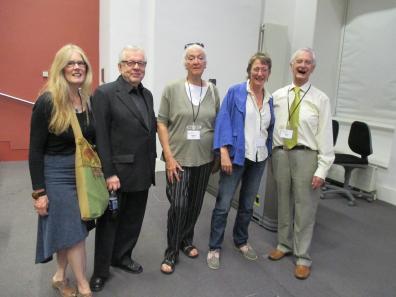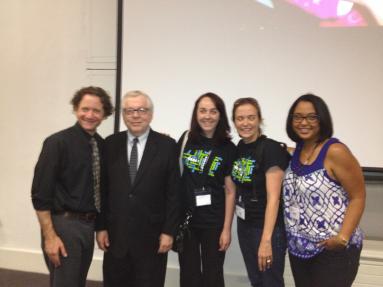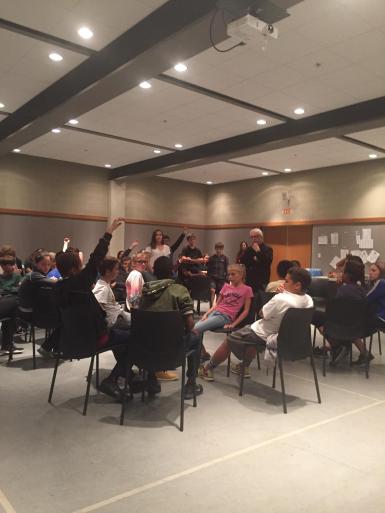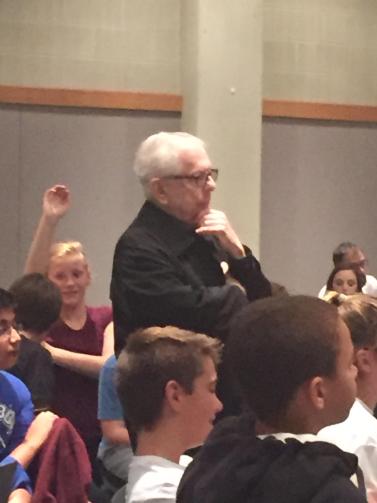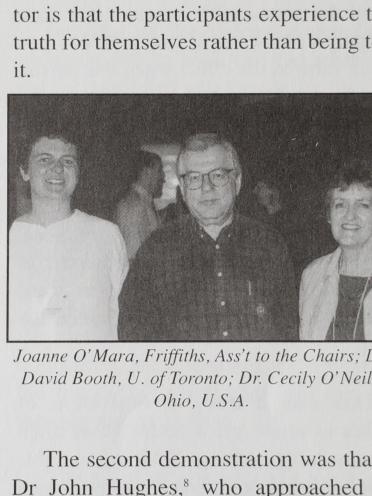A CODE TRIBUTE
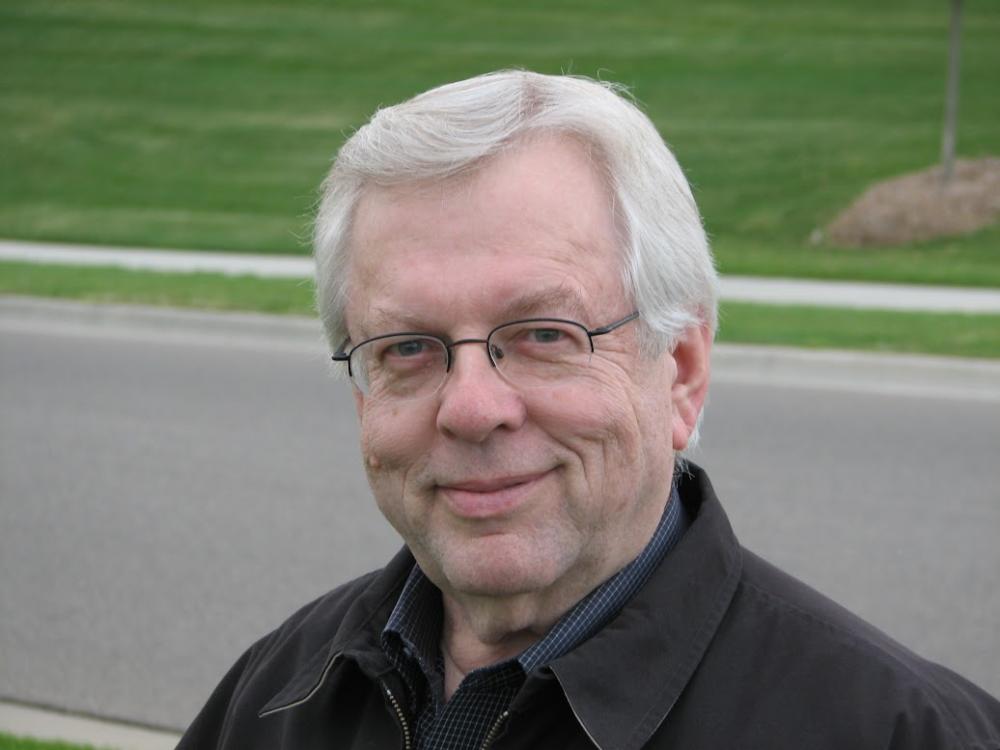
CODE celebrates his life of dedication to drama and to this organization. We express our respect and gratitude with this permanent website Tribute page.
We thank all those who worked on the Tribute video committee, and those who contributed photos, videos, and written tributes.
Navigation
CODE 2020 Tribute to David Booth
On October 24, 2020, CODE hosted a virtual video Tribute to David attended by friends, family, colleagues, and fans of David from far and wide.
Drama in the Classroom
Drama in the Classroom: Toronto Board of Education 1980. Director: Chuck Lundy. Courtesy of the Toronto District School Board.
This video focuses on several drama educators working with primary/junior students at various schools in the original Toronto Board of Education. The final segment is the one from which the clip for the Booth Tribute was taken.
Photo Gallery...created from submissions by CODE members
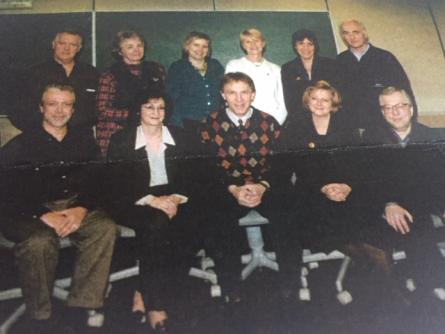

Written Tributes
Jane Deluzio, Former CODE President - Tribute speech at CODE-upon-Avon 2019:
David Booth challenged us from our very first class at the Faculty of Education in 1976. We were the “elite” class, those who majored in Drama at university.
He greeted us with this message: YOU are the most dangerous teachers for our students because you think you are going to teach stage directions, and theatrical make-up and spend all your time directing students in plays you choose for them. You will NOT be doing that here. WE are going to learn about how to teach students using drama.
David Booth was often scary, imperious and sarcastic, and he was always very direct in his feedback. We were terrified. AND we loved him. He showed us that the creative process and critical thinking were the focus of our work with students and that role-play was its solid foundation. He side-coached and challenged us until we learned that we would only be successful as teachers when our students found THEIR voices and were unafraid to use them, thoughtfully and with empathy. He taught us how to create safe spaces filled with high expectations, and how to provide the support students needed to achieve them. He forced us to take risks. He ensured that we understood that the Drama classroom, like the Theatre, is an empty space, and that it would be up to us to ensure what happened there did not become “deadly education”.
David was one of the key leaders behind the formation of CODE. He knew that we would need support from other drama teachers because we would most often find ourselves alone in our schools doing work no one else really understood or cared about. He connected us to the British, Australian and Canadian drama experts of the time, wrote books and spoke all over the world. He continued to teach at OISE and to push drama teachers to do drama and theatre in a good way until his death. He was my mentor and he was always there whenever I needed him. And now he is not. But he left a legacy that is strong and powerful and that is: ALL of US....here in this room, drama and dance teachers, together, at a CODE conference in 2019.
Judith Doan, former CODE president:
Teacher, writer, thinker, advocate – David Booth's impact on drama-in-education was profound. Not only was David instrumental in nurturing CODE and the development of so many teachers in Ontario, but his classes, workshops, talks, books, and stories impacted drama-in-education internationally. David provoked, motivated, inspired, encouraged, guided, and supported us. He touched so many of our lives. A champion to many, David Booth will continue to endure and be loved.
Kathy Fraumeni, former CODE board member who was supervised by David for her Master's degree:
My keenest memory of David Booth is David in a school gym, holding a book and surrounded by students who were captivated by his words, his voice and the kindness in his eyes. As teachers, we recognize those moments when children are completely caught up in a story; sitting cross-legged, elbows on their knees, chin cupped in their hands, hanging on every delicious word and turn of phrase. Those were the faces of over two hundred students at St. Mary’s Choir School that day, listening
to David tell a story.David will be remembered for enriching countless lives of students and educators through a lifetime of contributions to learning and drama in our schools. He was a wonderful listener, a mentor and, at the heart of it all, a teacher. As he sat among the students in the gym, he read and he asked questions; marvelous, intriguing, unexpected questions. And the children responded with funny, thoughtful, genuine, brilliantly childlike responses. David was a master questioner, a master teacher. I remember how fortunate we all felt to have had David visit our school and share his wisdom and his love of learning throughout a day that concluded all too soon. The students gave him a joyful sendoff, singing for him a beautiful Irish Blessing. What I remember most is David’s words of thanks to the children. He thanked them for inviting him to St. Mary’s and said simply, “You have taught me so much.”
A master teacher and a lifelong learner.
Cecily O'Neill, International authority, instructor and author, on process drama and arts in education:
David Booth was an inspirational teacher and an outstanding speaker. He directly influenced generations of Canadian teachers, many of whom have gone on to pursue distinguished careers as scholars and educators. Internationally, David was a powerful advocate for drama and literacy through his speeches - entertaining and moving in equal measure. In talking about teachers and teaching, David always included the authentic voices of the children he encountered.
I first met David when he was completing his graduate degree with Gavin Bolton at Durham. He acknowledged his debt to Gavin and Dorothy Heathcote, but, like all great teachers, he found his own unique approach to teaching drama. I was fortunate to watch him on several occasions and his use of picture books and mythic stories as a revelation. The video of David working with a picture book called ‘The King’s Fountain’ became an invaluable demonstration of the power of Teacher-in-Role for my graduate students at The Ohio State University. David’s respect for the children and teachers he worked with was clearly apparent and he always seemed to find the
best and most creative way to affirm even the most unexpected or inappropriate response.It was enlightening to watch David working in role. I remember a particular lesson during a drama conference in Ireland. He was scheduled to give a master class with students from a local secondary school. He met the group for the first time, on stage in a large hall, observed by all the conference delegates. The teenagers huddled together, frozen with self-consciousness. Working in role, David began a drama about a community where something mysterious had occurred. He asked the students, who were supposed to be in role as villagers, to tell him what they had witnessed. They were dumb as stones. After what seemed an agonizingly long time, David nodded wisely. ‘I understand’, he said, sympathetically. ‘You can’t talk about it.’
The students managed to nod. He had given them permission to be silent. ‘Perhaps you might be able to tell each other what happened.’ They turned to each other and began eagerly to share their imagined experiences. The simplicity and economy of David’s response unlocked their tongues and allowed them to forget their
self-consciousness and enter the drama.
In all his work, David stresses the importance of becoming a co-creator of the story or the drama. Sensitivity to language was another key concern. If I were to recommend a single book to a new teacher who knew nothing of drama, it would be Story Drama.
The chapter ‘Who’s in Charge’ about the role of the teacher is a masterly account of how to make drama happen. He writes:
‘By working inside the drama and alongside the children, by trying different roles and different voices in the safety of the drama experience, by actually caring about the content of the drama and by becoming passionately involved in the actions and reactions of the children, the teacher will learn with the children and feel the rewards and satisfaction of education at its most significant.’
Wise, witty and enormously generous to his students and his friends, David Booth is a huge loss to our field. I feel deeply privileged to have known him and experienced his artistry.
Sarah Papoff, Former CODE President - Tribute speech at CODE-upon-Avon 2019:
The day I found the book Improvisation by David Booth and Charles Lundy in my high school drama room was a sign. Little did I know at the age of 17, I was having my first encounter with one of my teacher-heroes.
I was late to the drama in education world. When I and my theatre degree moved back to Toronto, I re-discovered the literacy based drama work of David Booth. It NEVER failed to inspire. On one of David’s many visits to my elementary school, he captured the immediate attention of 900 staff, students and community members in a large school gym: in seconds.
A vignette: David Booth is the keynote at my first CODE conference - the 40th anniversary. He has prepared incredible footage of his work, a talk about his process drama with students through the years. Half way through, the tech just died. He looked directly at my new friend, Stephen, and said: You can fix this. It wasn’t a request. It wasn’t a command. It was faith that it would be taken care of. Delivered with dead pan inimitable humour. Stephen made the fix as David delivered the rest of his talk. As usual, he made us all laugh... and cry.
I went to OISE for my master’s and learned with David. His door was always open, diet Coke in hand, ready to chat and share ideas with a student. He was honest and forthright, a deep questioner and always with a twinkle in the eye offering next steps. He would work through a lesson or just listen and make sure you knew how brilliant you were and essential to the future he envisioned for education.
David worked with students during my graduate research, taking on the role of our UN ambassador. The students absolutely believed him. David demanded their very best selves, and they rose to the occasion. Every time I saw David Booth at work with a class, he would get to the heart of the students’ imaginations with carefully crafted questions.
David was more than a former CODE founder. He was our constant benefactor: donating space for events such as our website launch, and refusing to accept payment for catering. He was a drama in education champion and he connected educators to CODE from around the world.
He once wrote, In the Arts go to School:
“We need to give children nothing but our best. Every single time we work with young people we will struggle to know what best means.”
David never stopped being willing to struggle. And so, he was the best...truly a Master Teacher, Mentor
and Friend.
In David's Own Words
National Drama Conference 2008: David Booth and Dorothy Heathcote in Conversation - A Podcast
National Drama Durham Conference, April 2008. Courtesy of National Drama, UK.
CODE Conference 2016: David Booth in Conversation
David Booth, author, professor, pre-eminant drama educator and innovator speaks with CODE about his mentors, experiences teaching children and adults, and what CODE as an organization has meant to him. Enjoy this great read, and remember, David will be leading a drama game at our Big Schmooze Game Exchange on Friday night of our upcoming Conference at White Oaks in Niagara. Register today and don't miss out on this special opportunity to learn from and talk drama alongside impactful educators like David!
When were you first introduced to CODE, and what does the organization mean to you?
I attended the first CODE conference in the late sixties, and every year from then on for forty years while I was teaching. Meeting friends involved in drama education, people from professional theatre groups, speakers and workshop leaders, all were part of the CODE world, and I continue to value each experience. Before online communication, we had the CODE Journal, which was published yearly, and helped us share classroom practice and pedagogy internationally. The journal put CODE on the map of other provinces and universities, and gave us some impact on Ministry of Education policies and education documents, and that still holds true today.
Why do you continue to teach young people, and what are the differences between teaching young children and adults?
I was trained by my mentors to include demonstration classes in my workshops, so that participants would have authentic observations to form the basis of our discussions and learning. This is a complicated process, since I am a guest teacher with the students, and there is no set or specific outcomes preplanned for seeming success. As well, I often included the observing teachers working in role as the work progressed. The classroom teacher had the opportunity of seeing the students from new perspectives, while I could try out new strategies and resources as part of my drama learning and research. By seeing my own teaching as working with students in a learning context, I was freed from having to deliver a "show piece", and the "mistakes" and "rethinks" and "what if's" led to great discussions.
Today, I prefer working alongside the teacher, collaborating on the issues being explored, working in role sometimes, questioning the students as they role -play, responding spontaneously to the teacher working in role. I have had the good fortune of working with students in many different countries- Austria, the Czech Republic, the States, all the provinces, and each time I gained so much knowledge from "the doing of drama". Often teachers would later send me follow-up writing, art and reflections from their students, and these found a place in my articles and books. I was so fortunate to have these experiences to write about, actual classroom events I could use to frame my thoughts on teaching drama. I owe these teachers who loaned me their students so much.
You are a mentor to many in the drama community. Who are and have been your mentors?
I am only here in the drama world because of my mentors, and they are many. I began teaching middle school drama on a rotary timetable in 1960, and needed so much help. Fortunately, my English supervisor in Hamilton was Bill Moore, trained in England, and a true educational genius. He had established a drama program in every middle school in Hamilton, and once a month, we teachers met together to plan ideas for lessons, and he distributed poems and script suggestions for us to use in the following days. With 640 students on a rotary timetable, he was a teaching saviour to a newbie like me.
As time passed, I discovered the techniques of Brian Way, where he incorporated every member of the class in his improvised explorations, and my teaching life changed. Four students at the front of the room was now a part of the co-creation of the drama by all the students; group work became an important strategy for exploring ideas, for sharing work in progress, and the class made use of the group work as they developed their collaborative playmaking sessions. He also gave us games and activities that built community, and exercises that allowed individuals to freely respond in the safety of no observers.
Then the British invasion continued, with guest instructors on drama courses- Dorothy Heathcote, Gavin Bolton, Jonothan Neelands, and so many other mentors. I completed my grad degree at Durham University in the UK, and I owe so much to my fellow students and to my professors, Gavin and Dorothy.
All through my career, I have worked alongside fellow teachers- Bob Barton, Julianna Saxton, Chuck Lundy, Larry Swartz- and this collaborative meaning-making is my secret to success. And I have to mention the teachers I worked with, who were brave and passionate learners, plunging into the drama pool alongside me, building drama knowledge together.
What advice do you have for teachers in regards to drama education and education in general, and what are your hopes for the future of drama education?
We have learned over the years to celebrate and connect to the world of theatre, theatre in the biggest, widest, sense. It is the heart of our art form, and we want to use its strengths to support our work with students who will probably never become professionals, but like participating in music, art and dance, we can all come to explore our own selves through these forms, and try out and represent our growing ideas and feelings. For older students, they can begin to hone the skills and strategies that allow honest performance, and for all of our students, they can be involved in ensemble activities, often using subject content as the basis for the drama exploration, entering the "as if" world with "what if" dreams. Drama is both subject and system, and I am secure in knowing the arts will continue to hold a significant place in our schools.
Handout received by Jane Deluzio when David was her Faculty of Education professor in 1976:

If you wish to contribute a photo or written submission, please contact execadministrator[at]code.on.ca.





